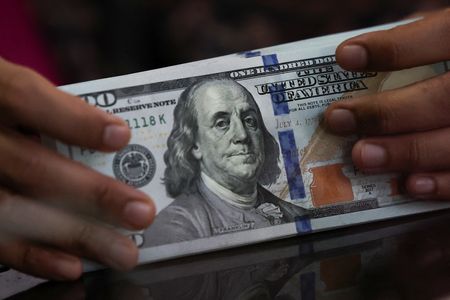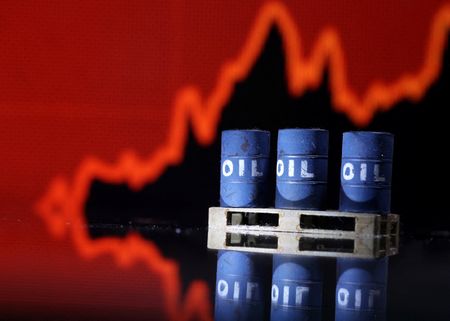By Laila Kearney and Arunima Kumar
(Reuters) – Oil prices strengthened on Monday as an attack on an oil pipeline pumping station in the Caspian Sea slowed flows from Kazakhstan, while investors monitored developments of a possible Moscow-Kiev ceasefire agreement that could ease sanctions and increase global supplies.
The dollar index, which hovered near a two-month low after weaker-than-expected U.S retail data for January, also boosted oil prices by making crude less expensive for non-U.S. buyers.
Brent crude futures settled at $75.22 a barrel, rising 48 cents. U.S. West Texas Intermediate crude rose 65 cents to $71.39 a barrel by 2:33 p.m. EST, and did not settle at its normal time due to the U.S. Presidents’ Day holiday. The public holiday led to relatively muted trading volumes.
Crude prices received support after drones struck the Kropotkinskaya pipeline pumping station in Russia’s southern Krasnodar region, reducing oil flows from Kazakhstan to world markets by Western producers, including Chevron and Exxon Mobil, the Caspian Pipeline Consortium said on Monday.
The CPC, which is the station’s operator, called the attack an act of terrorism, but did not specify that Ukraine had sent the drones. An official at Ukraine’s security service, however, said Kyiv had hit the station and a nearby oil refinery using drones.
“Although those drone attacks so far had limited disruption impacts on Russian crude exports, the rising frequency of those attacks is a concern that at some point it triggers some supply risks,” UBS analyst Giovanni Staunovo said.
The strikes came as the administration of U.S. President Donald Trump and Russia prepare for initial talks in Saudi Arabia in the coming days.
European leaders held an emergency meeting in Paris on Monday following Trump’s announcement of a possible imminent sit-down with Russian President Vladimir Putin, with Britain saying it was prepared to send peacekeeping troops to back up a possible Ukraine peace deal.
“Should sanctions relief allow it, we believe Brent crude oil prices could drop between $5 and $10/bbl if Russian barrels suddenly do not need to make a long journey to India or China, and more supply is suddenly made available,” BofA analysts said in a note.
The prospect of a global trade war also kept oil prices from moving higher after Trump ordered commerce and economic officials last week to study reciprocal tariffs against countries that place tariffs on U.S. goods.
Meanwhile, officials from OPEC+, which brings together the Organization of the Petroleum Exporting Countries and allies including Russia, said the group does not plan to delay a series of monthly oil supply increases scheduled to begin in April, after Bloomberg News reported that the group was examining whether to postpone the hikes.
(Reporting by Laila Kearney in New York, Yuka Obayashi in Tokyo, Jeslyn Lerh in Singapore and Arunima Kumar in Mumbai; Editing by Christian Schmollinger, Ed Osmond, Barbara Lewis, Chizu Nomiyama and Mark Porter)










